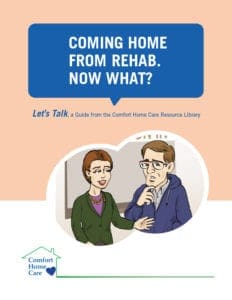
A Look at Respite Care
While traditional in-home care focuses solely on the needs of an elderly person, respite care is designed for the benefit of caregivers. Respite in-home care provides temporary relief for caregivers by lifting the stress and burden away. Depending on your unique needs, respite care can be provided just a couple hours a day or can extend to a few days a week. Similar to other in-home care services, respite care includes all of the home-based and skilled nursing care your loved one needs to live life happy and healthy.
As more and more elderly individuals choose to spend their golden years at home instead of in a nursing home or assisted living facility, the need for respite in-home care has quickly grown. Respite care can include as little or as much care as your loved one needs. For example, if your aging parent is fairly independent, you may hire a respite care provider to visit just once a day for a well-being visit. If your loved one requires more extensive care, a respite care provider can spend several hours a day in the home helping with personal hygiene, preparing meals, running errands, and providing similar care in the comfort of home.
Respite Care Services
Respite in-home care services can include a number of services based on the specific needs of your loved one and their level of independence. With insight from family members, an in-home care agency can create a care plan that outlines when to use the service, how much service is needed, and what type of care is required. Respite can be offered up to 24 hours a day if needed for elderly individuals who require constant care and supervision. In other instances, very little respite care may be needed.
Respite care providers can help in all aspects of personal care. For elderly individuals who have trouble with mobility or balance, a respite care provider can step in to provide assistance with bathing, dressing, grooming, and toileting. As proper nutrition is crucial for aging individuals, a respite care provider can also ensure that your loved one is eating right. Buying healthy food, helping to prepare meals, and feeding may be included in your loved one’s respite in-home care service plan. Other services may include light housework, shopping, help paying bills, and providing transportation to and from doctor appointments and other destinations.

Signs Respite Care Is Needed
It is important to recognize the signs that may indicate that a caregiver needs respite care. First, realize that everyone needs a break once in a while. Caregivers can be so focused on their loved one’s needs they often forget to take time for themselves. Having just a few hours or days to recharge and regroup can be highly beneficial for caregivers who provide regular in-home care. Common signs that may indicate the need for respite care include:
Irritability: If you find yourself snapping at your loved one more and more, it may be a red flag that respite care is needed. The repetition involved in in-home care can be irritating over time. Fortunately, a small break can make a big difference in your outlook.
Mistakes: Do you find yourself making small mistakes over and over? While nobody’s perfect, making too many mistakes in a short period of time could mean that you are overly stressed.
Loneliness: If you spend most of your time caring for others, you leave little time for socialization. This can be very lonely and isolating, especially for people who enjoy spending time with others. Respite care can ensure that you have the time you need for healthy socialization.
Depression: Caregiving can be depressing when performed over an extended period of time. As your loved one’s health continues to decline, you may feel grief and a loss of motivation. Taking a respite is essential in this type of situation.
Illness: If you are suffering from a chronic medical condition or even a short-term illness, respite care may provide the relief you need until you can recover.
Personal Time: Whether it is a weekend getaway with your significant other or some time spent at home watching movies and just relaxing, respite care is available so you can have some much-needed “me” time.
Learn More About Respite Care
Respite in-home care services can be an invaluable resource for caregivers of elderly individuals with special health care needs. They can provide families with a break from the tedious tasks involved in personal care and ensure that they get the space they need to care for their own health. When caregivers utilize respite care services, they can return to their duties with more energy and a better outlook at life. Do you need a break from your caregiving duties or just want a few hours a week to dedicate to your own well-being? If so, schedule a consultation with an in-home care agency today.






